Stories & Legends
 |
 |
 |
 |
 |
 |
 |
Miracles in the Crusades - 3
The Maccabees & the Crusaders
The Crusaders at the Battle of Antioch had no difficulty believing that Saints could give their assistance in battle, as they were well aware that the Angels had helped the Maccabees in the Old Testament in similar circumstances. Various chroniclers of the First Crusade – Fulcher, Guibert of Nogent, William of Malmesbury and Gilo of Paris – specifically mention the divine aid received by the Maccabees in their accounts of the First Crusade. (1)
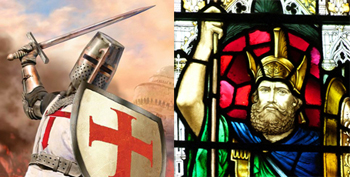 For example, Fulcher compares the Crusaders to Maccabees as those willing to die for their faith. Thus does the chronicler draw a parallel between miracles on behalf of the Maccabees and the heavenly intervention of Saints in the Battle of Antioch. (2)
For example, Fulcher compares the Crusaders to Maccabees as those willing to die for their faith. Thus does the chronicler draw a parallel between miracles on behalf of the Maccabees and the heavenly intervention of Saints in the Battle of Antioch. (2)
In Gilo of Paris’ epic poem, Gilo begins describing the capture and Battle of Antioch in these words: “Come, Christ the King, reveal now the accustomed prowess which neither the strength of men nor many weapons give to you. Come, O Christ, grant now the divine gift often granted to your Maccabees, that one may trounce thousands upon thousands.” (3)
As a side note, it is interesting to see how any episodes from the historical books of the Old Testament are referred to in the chroniclers’ accounts, references that the Crusaders would have been quite familiar with. It certainly dispels the myth that medievalists did not know the Bible.
For example, in The Capture of Damietta (in the Fifth Crusade) written by eyewitness Oliver of Paderborn, he notes that the leaders had fallen into “idleness and laziness according to their custom. They invented a motive for deferring negotiations, and they did not imitate Judas Maccabeus who, ‘seeing that the time served him,’ gave no rest to the enemy.” (4)
Clearly the Crusaders were well aware of the history of the Maccabees and related that fight to the battle of their days.
Judas Maccabeus & the Maccabees
Who were the Israelite Maccabees, to whom the Christian Crusaders were proud to compare themselves?
The Maccabees were a priestly family who, under the leadership of the Jewish priest Mattathias, called for an uprising against King Antiochus Epiphanes IV of Syria in the 2nd century before Christ. Antiochus, determined to force Hellenism, as the Greek paganism was known, upon his Jewish subjects, issued decrees forbidding Jewish religious practice. He also desecrated the Temple in Jerusalem by sacrificing a pig on the altar and erecting a statue of Zeus in the Holy of Holies. This was called the abomination of desolation.
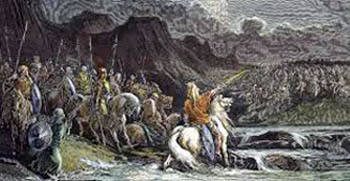 When Mattathias refused to worship the Greek gods, a Hellenistic Jew stepped forward to take his place and sacrifice to an idol. Mattathias killed the Jew and then fled with his five sons to the wilderness of Judah.
When Mattathias refused to worship the Greek gods, a Hellenistic Jew stepped forward to take his place and sacrifice to an idol. Mattathias killed the Jew and then fled with his five sons to the wilderness of Judah.
One year later Judas, Mattathias’ third and most able son, called Maccabe, which means “hammer,” led an army of faithful Jews to a first victory over the Seleucid dynasty in what is known today as the Maccabean Revolt. This Jewish battle led by Judas Maccabeus, whose troops were generally outnumbered 3 to 1 lasted from 167 to 160 BC.
Finally, the Maccabees entered Jerusalem in triumph and ritually cleansed the Temple on the same day it had been desecrated by the Greeks and reestablished traditional Jewish worship there, installing Jonathan Apphus, Judas’ youngest brother, as high priest.
Every battle that Judas Maccabeus fought was a victory until he made a pact with the Romans for protection from the Greeks; then he was finally killed in battle in the year 151 BC.
The first intervention of Heaven
Judas Maccabeus and his army, under the leadership of the Lord, recaptured the Temple and city of Jerusalem in 164 BC. But the Seleucids had not given up. The general of the armies of Syria, Timothy, who had been defeated by the Maccabean army once before, gathered a large army and advanced to take Judea.
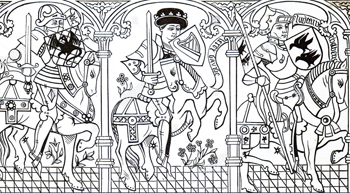 After preparing themselves by putting on sackcloth and praying face downward on the steps of the altar, Judas and his men entered battle.
After preparing themselves by putting on sackcloth and praying face downward on the steps of the altar, Judas and his men entered battle.
During the thickest of this battle in Gezer, the Maccabees saw five resplendent men descending from Heaven, mounted on horses with golden bridles. They rode to the head of the army of the Jews, and surrounded Judas Maccabeus, the captain of the army of the Lord.
These five heavenly horsemen shielded him, protecting him with their own armor, while they launched fiery darts and thunderbolts against the enemy, blinding them by the brilliance. Mortally afraid and terrified, the enemies fell into confusion, broke ranks, and the Jews cut them to pieces, slaughtering 20,500 infantry and 600 cavalry. (2 Mac 10:24-31)
The Maccabees, their hearts lifted by this heavenly intervention, went on to take the strongly defended fort of Gezzer. And, when it was over, Scriptures relates: “The Jews celebrated by singing hymns and songs of thanksgiving to the Lord, who had shown them great kindness and had given them victory.” (2 Mac 10:38)
Second miraculous intervention
The second assistance from Heaven recorded in the Old Testament came shortly after Timothy was defeated. Viceroy Lysias led 24,00 infantry and cavalry against the Jews with the intention of turning Jerusalem into a Greek city.
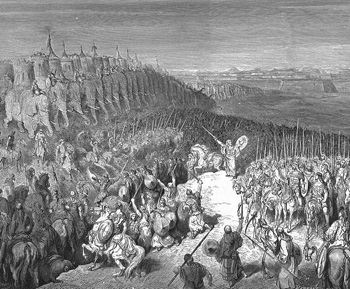 Lysias set up camp in Beth Zur in southernmost Judea and, Scriptures record: “He saw himself so self confident with his tens of thousands of infantry, his thousands of cavalry and his 80 elephants that he failed to take into account the power of God.” (2 Maccabees 11:4)
Lysias set up camp in Beth Zur in southernmost Judea and, Scriptures record: “He saw himself so self confident with his tens of thousands of infantry, his thousands of cavalry and his 80 elephants that he failed to take into account the power of God.” (2 Maccabees 11:4)
Then he set out to march his great force of men to Jerusalem. Now, when Judas and his men heard that Lysias was laying siege to their fortress, they and all the people cried and wept, begging the Lord to send a good Angel to save them.
Judas led his men out of Jerusalem to meet the enemy. But, “when they had not gone far from Jerusalem, suddenly they noticed they were being led by a horseman dressed in white and carrying gold weapons.
“Immediately all of them together thanked God for His mercy; He had made them brave enough to attack not only men, but even the most savage animals or even walls of iron. So, they marched in battle formation and, with them went the one whom the Lord in His mercy had sent to fight on their side.
“Then, they charged into the enemy like lions, killing 11,000 infantry and 1,600 cavalry, and forcing the rest to run for their lives. Most of those who ran were wounded and had lost their weapons, and Lysias himself managed to escape only because he ran away like a coward.” (2 Mac 11:6-12)
The Jews had prayed to God for an Angel to fight with them, and the Lord sent the Angel horseman dressed in white who led them to victory.
After that defeat, Lysias sued for a peace with Judas Maccabeus.
The Crusaders & the Maccabees
The Crusaders could easily identify with the Maccabees because they considered it perfectly natural to receive help from the heavenly cavalry during decisive battles. Thus, when the white horsemen came charging out of Heaven during the Siege of Antioch in 1098, this intervention was taken as something just and proper, since, according to Guibert of Nogent (p. 107), Crusaders were much more deserving of celestial help than the Maccabees.
For, truly, Crusaders “poured out their blood for Christ, purifying the churches and propagating the Faith,” while the Jews were just “fighting for circumcision and the meat of swine” (5) For, Antiochus had tried to ban circumcision and desecrated altars by sacrificing pigs.
What could be more reasonable than that the Saints would come to aid the Crusaders just as Angels once gave help to the Maccabees?
Continued
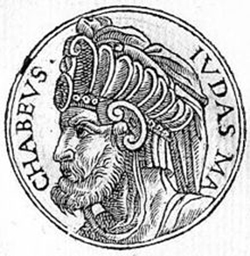

Crusaders identified strongly with the great warrior Judas Maccabeus
In Gilo of Paris’ epic poem, Gilo begins describing the capture and Battle of Antioch in these words: “Come, Christ the King, reveal now the accustomed prowess which neither the strength of men nor many weapons give to you. Come, O Christ, grant now the divine gift often granted to your Maccabees, that one may trounce thousands upon thousands.” (3)
As a side note, it is interesting to see how any episodes from the historical books of the Old Testament are referred to in the chroniclers’ accounts, references that the Crusaders would have been quite familiar with. It certainly dispels the myth that medievalists did not know the Bible.
For example, in The Capture of Damietta (in the Fifth Crusade) written by eyewitness Oliver of Paderborn, he notes that the leaders had fallen into “idleness and laziness according to their custom. They invented a motive for deferring negotiations, and they did not imitate Judas Maccabeus who, ‘seeing that the time served him,’ gave no rest to the enemy.” (4)
Clearly the Crusaders were well aware of the history of the Maccabees and related that fight to the battle of their days.
Judas Maccabeus & the Maccabees
Who were the Israelite Maccabees, to whom the Christian Crusaders were proud to compare themselves?
The Maccabees were a priestly family who, under the leadership of the Jewish priest Mattathias, called for an uprising against King Antiochus Epiphanes IV of Syria in the 2nd century before Christ. Antiochus, determined to force Hellenism, as the Greek paganism was known, upon his Jewish subjects, issued decrees forbidding Jewish religious practice. He also desecrated the Temple in Jerusalem by sacrificing a pig on the altar and erecting a statue of Zeus in the Holy of Holies. This was called the abomination of desolation.

Judas Maccabeus led his army to victory after victory
One year later Judas, Mattathias’ third and most able son, called Maccabe, which means “hammer,” led an army of faithful Jews to a first victory over the Seleucid dynasty in what is known today as the Maccabean Revolt. This Jewish battle led by Judas Maccabeus, whose troops were generally outnumbered 3 to 1 lasted from 167 to 160 BC.
Finally, the Maccabees entered Jerusalem in triumph and ritually cleansed the Temple on the same day it had been desecrated by the Greeks and reestablished traditional Jewish worship there, installing Jonathan Apphus, Judas’ youngest brother, as high priest.
Every battle that Judas Maccabeus fought was a victory until he made a pact with the Romans for protection from the Greeks; then he was finally killed in battle in the year 151 BC.
The first intervention of Heaven
Judas Maccabeus and his army, under the leadership of the Lord, recaptured the Temple and city of Jerusalem in 164 BC. But the Seleucids had not given up. The general of the armies of Syria, Timothy, who had been defeated by the Maccabean army once before, gathered a large army and advanced to take Judea.

A woodcut engraving depicting Joshua, David and Judas Maccabeus as Crusader Knights
During the thickest of this battle in Gezer, the Maccabees saw five resplendent men descending from Heaven, mounted on horses with golden bridles. They rode to the head of the army of the Jews, and surrounded Judas Maccabeus, the captain of the army of the Lord.
These five heavenly horsemen shielded him, protecting him with their own armor, while they launched fiery darts and thunderbolts against the enemy, blinding them by the brilliance. Mortally afraid and terrified, the enemies fell into confusion, broke ranks, and the Jews cut them to pieces, slaughtering 20,500 infantry and 600 cavalry. (2 Mac 10:24-31)
The Maccabees, their hearts lifted by this heavenly intervention, went on to take the strongly defended fort of Gezzer. And, when it was over, Scriptures relates: “The Jews celebrated by singing hymns and songs of thanksgiving to the Lord, who had shown them great kindness and had given them victory.” (2 Mac 10:38)
Second miraculous intervention
The second assistance from Heaven recorded in the Old Testament came shortly after Timothy was defeated. Viceroy Lysias led 24,00 infantry and cavalry against the Jews with the intention of turning Jerusalem into a Greek city.

Judas Maccabeus and his outnumbered men defeat the troops of Lysias
Then he set out to march his great force of men to Jerusalem. Now, when Judas and his men heard that Lysias was laying siege to their fortress, they and all the people cried and wept, begging the Lord to send a good Angel to save them.
Judas led his men out of Jerusalem to meet the enemy. But, “when they had not gone far from Jerusalem, suddenly they noticed they were being led by a horseman dressed in white and carrying gold weapons.
“Immediately all of them together thanked God for His mercy; He had made them brave enough to attack not only men, but even the most savage animals or even walls of iron. So, they marched in battle formation and, with them went the one whom the Lord in His mercy had sent to fight on their side.
“Then, they charged into the enemy like lions, killing 11,000 infantry and 1,600 cavalry, and forcing the rest to run for their lives. Most of those who ran were wounded and had lost their weapons, and Lysias himself managed to escape only because he ran away like a coward.” (2 Mac 11:6-12)
The Jews had prayed to God for an Angel to fight with them, and the Lord sent the Angel horseman dressed in white who led them to victory.
After that defeat, Lysias sued for a peace with Judas Maccabeus.
The Crusaders & the Maccabees
The Crusaders could easily identify with the Maccabees because they considered it perfectly natural to receive help from the heavenly cavalry during decisive battles. Thus, when the white horsemen came charging out of Heaven during the Siege of Antioch in 1098, this intervention was taken as something just and proper, since, according to Guibert of Nogent (p. 107), Crusaders were much more deserving of celestial help than the Maccabees.
For, truly, Crusaders “poured out their blood for Christ, purifying the churches and propagating the Faith,” while the Jews were just “fighting for circumcision and the meat of swine” (5) For, Antiochus had tried to ban circumcision and desecrated altars by sacrificing pigs.
What could be more reasonable than that the Saints would come to aid the Crusaders just as Angels once gave help to the Maccabees?
- Elizabeth Lapina, Warfare and the Miraculous in the Chronicles of the First Crusade, Pennsylvania State University Press, 2015, p. 97.
- Ibid, p 107.
- Ibid., p. 108.
- Edward Peters, Christian Society and the Crusades (1198-1229), Un. of Pennsylvania Press, 1971, p. 68.
- Guibert of Nogent, Dei gesta per Francos, ed. by Robert B. C. Huygens, CCCM, vol. 127, Turnhout, 1993, p. 240.

Judas Maccabeus
.
Posted February 27, 2019
Posted February 27, 2019


